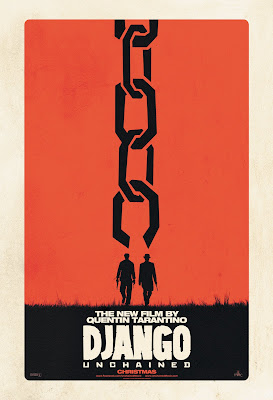The Big Screen: Django Unchained
B.O. was back in town for a couple days and he, Sweets, and I caught the old fogey matinee showing of Django Unchained yesterday.
Django is set in 1858 in the antebellum South. Dr. King Schultz, a former dentist turned bounty hunter played by Christoph Waltz, “buys” Django, a slave played by Jamie Foxx. Schultz needs Django to identify three criminals with a bounty; once they have done so, Schultz promises Django that he will go free. Schultz learns that Django has a wife, Broomhilda, and that they were sold separately. Django plans to find and buy her once he is free. Schultz agrees to help Django and they team up for a winter bounty hunting campaign before heading to Mississippi to track down Broomhilda. They learn she was sold to Calvin Candi (Leonardo DiCaprio), who owns a plantation called Candyland and trains male slaves for gladiator-style “mandingo fights.” Schultz poses as a German interested in buying one of Candi’s top fighters and Django as his “slaver” scout. They hope to access Candyland and buy Broomhilda as well.
I am going to stop there because I would spoil the last half hour or so of the movie if I went any farther.
First thing’s first: Quentin Tarantino is still seemingly obsessed with the n-word. He has gotten a lot of flack for using it liberally in his previous movies — most notably in Pulp Fiction’s “The Bonnie Situation” — but I suppose this time he can play the historical accuracy card, if there is such a thing.
Speaking of historical accuracy, the depictions of slavery and the inhuman treatment of slaves were horrific and disturbing, and for that I applaud Tarantino. Slavery is the massive, ugly, and unbleachable stain on American history and it should make people sick. Most of the white characters treated blacks as property and it was disgusting to see even on film. Culturally, the movie seemed historically accurate, though I cannot attest to certain aspects. According to Slate, there are no historical records of gladiator-like fights between slaves. Also, I was most curious about a couple scenes that involved beer. At a saloon, Schultz draws a couple glasses of beer at the taps. I have no clue how common taps where in the 1850s, especially in small town saloons. Also, there are a couple scenes with beer bottles, some of which had swing caps. Were there bottles with swing caps at the time? I have no clue.
Aesthetically and cinematically, the movie is quintessential Tarantino. It is well-crafted and stylistically stunning. The plot is sometimes a little too convenient and there are a couple curiosities that go unexplained, but such is Hollywood. Also, the acting is brilliant.
And then there’s the violence.
Around two hours into the flick, I was thinking, “This is an incredible movie.” However, I was expecting a twist, something that kept the movie going for another forty minutes or so. And then it happened, and my opinion dropped a couple notches.
To be honest, I do not like blood and gore in movies. I have recently been making my way through Goodfellas again and can stomach the violence and blood in that movie. However, needless mutilations and splattering brains disgust me. I do not like seeing characters get their heads blown apart. It is repulsive — yet it sells movie tickets. And it seems to me that is exactly what much of the violence in Django is meant to do.
At that point in the movie (and if you see the movie, you will know exactly what I am talking about) it became meaningless and cartoonish. A lot of people are going to rave about how great it was and obsess about all the blood, much like they did with the first volume of Kill Bill, but for me it almost ruined the movie. It was stupid. I could not believe someone would purposely demean such a great movie that way.
On a lighter note, Django had its funny moments. It was smart and hysterical at times. It also presented a who’s who of cameos. Tarantino movies seem to have become a modern Hollywood happening, much like the epic films of the fifties and sixties. Samuel L. Jackson, Don Johnson, Bruce Dern, Jonah Hill, Robert Carradine, Tom Savini, and (of course) Quentin Tarantino all have roles of varying importance.
All in all, Django will probably be regarded as another Tarantino masterpiece. It has been a while since I saw the Kill Bill volumes, and I never saw Death Proof, but I think Django eclipses everything Tarantino has done this century. Overall, though, Jackie Brown is still my favorite.


